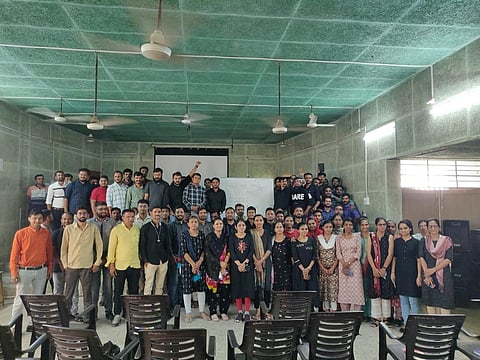

AHMEDABAD: Even though the Centre has reportedly informed the parliament that it is not considering scrapping the New Pension Scheme (NPS), various outfits are up in arms demanding to revert to the Old Pension Scheme.
The NPS or Contribution-based pension scheme called National Pension System (NPS) took effect on April 1, 2004. It was launched reportedly as a way for the government to get rid of pension liabilities.
In Gujarat, while earlier, united employees of different government departments had launched a two-day nationwide strike, on Friday, primary teachers across the state protested wearing black badges. Teachers arrived at their school 15 minutes ahead of schedule and observed a two-minute silence carrying banners demanding to revert to the Old Pension Scheme. Various forms of protests took place in Ahmedabad, Surat, Rajkot, and Vadodra.
Rakesh Kantharia National Advisor and Gujarat in-charge of NOPRUF (National Old Pension Restoration United Front), said that pensions paid by the state or from the state consolidated fund under the Seventh Schedule of the Constitution are ranked 42nd among the subjects in the state list. Accordingly, the payment of pension to the Government servants is included in the agenda of the State, on which the State Government may take an independent decision about the pension.
Retired professor of Bhavnagar University Nishit Joshi Said “CAG Report No. 13 of 2020 and the Second National Judicial Pay Commission have also raised questions about the efficacy of the NPS in providing guaranteed socio-economic security to the employees. Under the NPS, the hard-earned retirement fund of employees is subjected to the vagaries of the share market which fluctuates at the drop of a hat. An employee cannot work with his full potential and contribute to good governance if his socio-economic security is threatened.”
In the state of Gujarat, at the end of the financial year 2022-23, the government will spend Rs 38,020 crore on salaries and Rs 20,073 crore on pensions. An official document from the finance department said that the government's salary expenditure was increasing, against which pension expenditure was declining. But as the number of retirees increases, so does the impact of this decline.
“Implementing the old pension scheme in place of NPS would enable the government to recover the amount of its matching contribution so far deposited in the NPS account and the employees' share from the stock market-based scheme. So that there is no question of any burden on the state budget at present and also the amount of monthly contribution will be saved,” Rakesh Kantharia added.
The Rajasthan government has reverted to the old scheme by scrapping the new pension scheme-NPS which is less beneficial to the employees, following which the state governments in other states including Gujarat are also facing resistance from their employees, a teachers union leader said.
Meanwhile, a few days back, employees at the Gandhinagar Secretariat wrote to the Chief Minister's Office to cancel the NPS. Earlier, Various employees across Gujarat have also protested on this issue by handing over a memorandum to the district collectors.